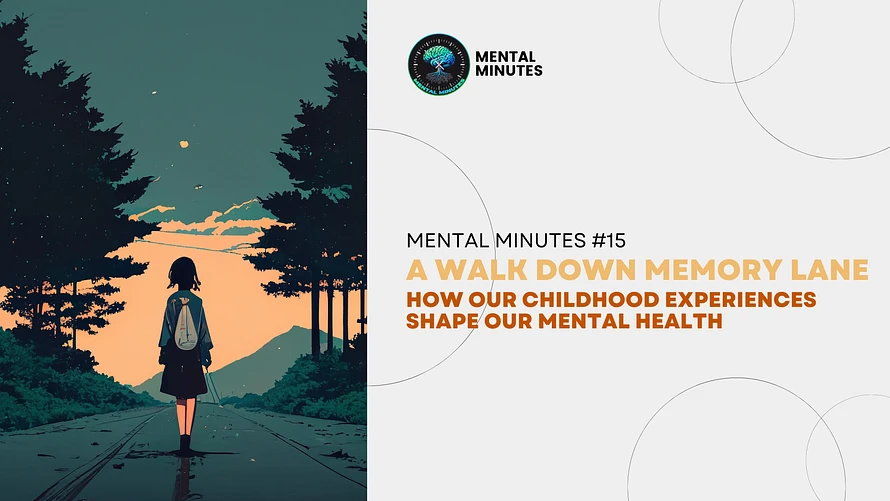A Walk Down Memory Lane: How Our Childhood Experiences Shape Our Mental Health
A Walk Down Memory Lane
I remember the first time I saw the world from the top of a tree. I was eight years old, my hands clutching the rough bark, my heart pounding with the thrill of having conquered something taller than my father. It wasn’t just a tree—it was my fortress, my sanctuary. I could see the entire neighborhood from up there, and for a brief moment, the world was mine.
But not all childhood memories are as carefree. Some are filled with shadows that linger long after the moment has passed. As I grew older, I began to realize that these early experiences—both the triumphant and the traumatic—were more than just memories. They were the building blocks of my mental health, shaping the way I saw the world, the way I handled stress, and even the way I loved.
The Impact of Childhood on Mental Health
Our childhood experiences play a critical role in shaping our mental health, influencing everything from emotional regulation to interpersonal relationships. According to the Centers for Disease Control and Prevention (CDC), adverse childhood experiences (ACEs) are linked to a wide range of negative outcomes, including mental health issues, substance abuse, and chronic diseases in adulthood .
How Experiences Shape the Brain
During childhood, the brain is in a critical period of development, with neural pathways being formed and strengthened based on experiences. This is a time when the brain is incredibly plastic, meaning it is highly responsive to the environment and can be shaped by both positive and negative experiences.
Research from Harvard University's Center on the Developing Child shows that chronic stress during childhood, such as living in an environment of abuse or neglect, can disrupt the development of neural circuits that manage stress responses. This can lead to an overactive stress response system, making individuals more vulnerable to anxiety, depression, and other mental health disorders later in life .
Numbers That Tell a Story
The connection between childhood experiences and mental health is not just theoretical; it's backed by compelling data. A study published in the American Journal of Psychiatry found that individuals who experienced childhood trauma were twice as likely to develop depression and anxiety disorders in adulthood compared to those who did not experience such trauma .
Another significant study, the Adverse Childhood Experiences (ACE) Study, conducted by the CDC and Kaiser Permanente, revealed that individuals with four or more ACEs were seven times more likely to suffer from alcoholism and twelve times more likely to attempt suicide compared to those with no ACEs . The same study found that those with high ACE scores were also more likely to experience relationship difficulties and struggle with chronic health conditions such as heart disease and diabetes.
The Silver Lining
While the statistics paint a sobering picture, it's essential to remember that not all is lost. Resilience, the ability to bounce back from adversity, can be a powerful counterbalance to early negative experiences. Studies have shown that supportive relationships, particularly with a caring adult, can mitigate the effects of childhood adversity and promote mental well-being .
One such study published in the Journal of Child Psychology and Psychiatry found that children who had strong, supportive relationships were significantly less likely to develop mental health issues, even in the face of multiple ACEs . This underscores the importance of early intervention and the role that parents, teachers, and community members can play in fostering resilience in children.
The Path Forward
As I sit here, years removed from that childhood tree, I realize that the roots of our mental health run deep. They intertwine with the experiences of our youth, shaping the adults we become. While we can't change the past, we can understand its impact, and through that understanding, we can forge a path toward healing and resilience.
For parents, caregivers, and educators, the takeaway is clear: every moment counts. The environment we create for our children today will echo in their mental health tomorrow. By fostering supportive, nurturing relationships and addressing adversity early on, we can help ensure that the trees they climb are not only tall but also sturdy enough to weather life's storms.
References
- Centers for Disease Control and Prevention (CDC). (n.d.). Adverse Childhood Experiences (ACEs). Retrieved from https://www.cdc.gov/violenceprevention/aces/index.html
- Harvard University Center on the Developing Child. (n.d.). Toxic Stress. Retrieved from https://developingchild.harvard.edu/science/key-concepts/toxic-stress/
- Heim, C., & Nemeroff, C. B. (2001). The role of childhood trauma in the neurobiology of mood and anxiety disorders: Preclinical and clinical studies. Biological Psychiatry, 49(12), 1023-1039.
- Felitti, V. J., Anda, R. F., Nordenberg, D., Williamson, D. F., Spitz, A. M., Edwards, V., ... & Marks, J. S. (1998). Relationship of childhood abuse and household dysfunction to many of the leading causes of death in adults: The Adverse Childhood Experiences (ACE) Study. American Journal of Preventive Medicine, 14(4), 245-258.
- Werner, E. E. (1993). Risk, resilience, and recovery: Perspectives from the Kauai Longitudinal Study. Development and Psychopathology, 5(4), 503-515.
